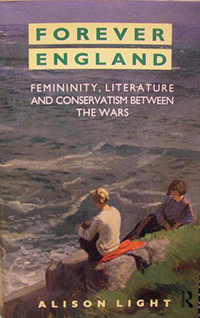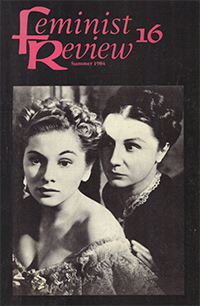Forever England
A study of interwar culture and Englishness through the lens of popular women writers.
Forever England: Literature, Femininity and Conservatism between the Wars, Alison Light (Routledge, 1991)
"A searching and sympathetic look at the appeal of four popular women writers of the inter-war period...Ivy Compton Burnett, Daphne du Maurier, Agatha Christie and ‘Mrs Miniver’....Inter-disciplinary in the best sense, drawing on biography, history or literary criticism as the analysis requires, Light redefines the boundaries and opens up the discussion of these writers to wholly new questions."
Norma Clarke, Everywoman, March 1992

Sheffield Hallam University
If you are interested in literary tastes, bestsellers and the 'culture wars' of the 20th century, visit the Special Collection of books, and other materials 'Readerships and Literary Cultures 1900-1950', held at Sheffield Hallam University and open to all researchers.![]() View www.middlebrow-network.com for contents and catalogue
View www.middlebrow-network.com for contents and catalogue
"You have to hand it to her. She writes with candour and wisdom and enviable range of historical knowledge. There is something of interest on every page. Our understanding of Englishness will never be the same again. She has taken inter-war studies into a new realm where place and people, language and literature, cultures high and low, public and private, left and right are brought together as fit subjects for interaction. Her study of du Maurier alone is worth the price of the book."
Robert Colls, Journal of Historical Geography, 19 (1993)
"Forever England is both readable and instructive. It is a good example of the new energies which - an optimist might think - are transforming literary criticism and making it attractive to those outside the discipline. ... Light's analyses are deft and convincing."
John Sutherland, Comparative Studies in Society and History, Vol. 36 /1 1994
"As Light remarks in her introduction, feminist criticism has tended to dismiss the inter-war years as a kind of benighted age when women stood still or even fell back, socially and politically, a dead period between the first and second waves of feminism. Forever England gives us reasons to re-evaluate the lives and the achievements of women during this era and thereby opens up a fascinating and rewarding new area for feminist research in the United States as well as in Great Britain."
Women’s Review of Books
 From Hitchcock's film, Rebecca - see Alison's article 'Returning to Manderley' in Feminist Review 16
From Hitchcock's film, Rebecca - see Alison's article 'Returning to Manderley' in Feminist Review 16
Were the interwar years really unrelieved gloom?
![]() Read Alison's review of Richard Overy's The Morbid Age in the Guardian
Read Alison's review of Richard Overy's The Morbid Age in the Guardian
© Alison Light 2024
